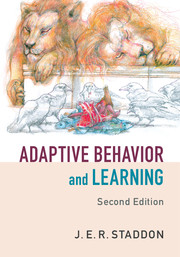Book contents
- Frontmatter
- Contents
- Preface to the second edition
- Acknowledgments
- 1 The evolution, development, and modification of behavior
- 2 Variation and selection: kineses
- 3 Reflexes
- 4 Direct orientation and feedback
- 5 Operant behavior
- 6 Reward and punishment
- 7 Feeding regulation: a model motivational system
- 8 The optimal allocation of behavior
- 9 Choice: dynamics and decision rules
- 10 Foraging and behavioral ecology
- 11 Stimulus control and cognition
- 12 Stimulus control and performance
- 13 Molar laws
- 14 Time and memory, I
- 15 Time and memory, II
- 16 Template learning
- 17 Learning, I
- 18 Models of classical conditioning
- 19 Learning, II
- 20 Learning, III: procedures
- 21 Comparative cognition
- Index
16 - Template learning
Published online by Cambridge University Press: 05 March 2016
- Frontmatter
- Contents
- Preface to the second edition
- Acknowledgments
- 1 The evolution, development, and modification of behavior
- 2 Variation and selection: kineses
- 3 Reflexes
- 4 Direct orientation and feedback
- 5 Operant behavior
- 6 Reward and punishment
- 7 Feeding regulation: a model motivational system
- 8 The optimal allocation of behavior
- 9 Choice: dynamics and decision rules
- 10 Foraging and behavioral ecology
- 11 Stimulus control and cognition
- 12 Stimulus control and performance
- 13 Molar laws
- 14 Time and memory, I
- 15 Time and memory, II
- 16 Template learning
- 17 Learning, I
- 18 Models of classical conditioning
- 19 Learning, II
- 20 Learning, III: procedures
- 21 Comparative cognition
- Index
Summary
Most animals are small and do not live long. Flies, ants, protists, nematodes, and similar small creatures make up most of the biomass of the planet. A small animal with short life-span has little reason to evolve much learning ability. Because it is small, it has little of the complex neural apparatus needed; because it is short-lived, it has little time to exploit what it learns. Life is a trade-off between spending time and energy learning new things, and exploiting things already known. The longer an animal's life-span, and the more varied its niche, the more worthwhile it is to spend time learning.
It is no surprise, therefore, that learning plays a rather small part in the lives of most animals. Learning is not central to the study of all behavior, as was at one time believed. Learning is interesting for other reasons: It is involved in most behavior we would call intelligent, and it is central to the behavior of people.
Learning cannot be directly observed because it represents a change in an organism's potential. There is a difference between learning and performance. Learning is situation specific: Experience changes behavior in some situations but not others. We know an animal has learned only after an appropriate test. No failure can be conclusive. There is always the possibility that a new test, some new situation, not previously tried, may show evidence of learning where other tests have failed.
Some kinds of experience are usually excluded from “learning.” A change in behavior is necessary but not sufficient: For example, a change brought about by physical injury or restraint, by fatigue, or by illness does not count. Short-term changes, such as habituation, adaptation, or sensitization (Chapters 2–4) are also excluded – the change wrought must be relatively permanent. Forgetting has an ambiguous status: The change is usually permanent and does not fall into any of the forbidden categories, yet it is paradoxical to call forgetting an example of learning. Evidently, it is not just any quasi-permanent change that qualifies. Learning is a category from common speech, defined largely by exclusion. As I pointed out in Chapter 1, learning is not a technical term.
Still, we must begin somewhere. For convenience, I will distinguish two main types of learning, template learning and reinforced learning.
- Type
- Chapter
- Information
- Adaptive Behavior and Learning , pp. 445 - 456Publisher: Cambridge University PressPrint publication year: 2016



